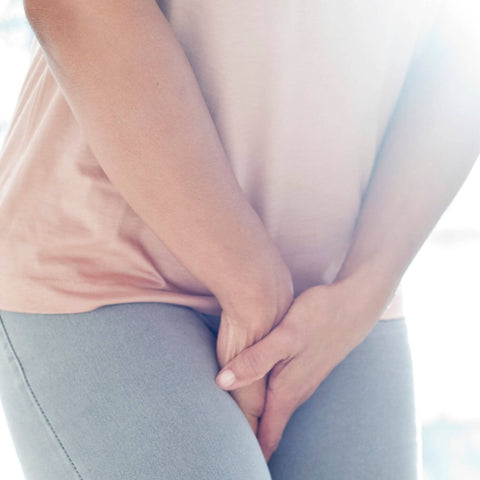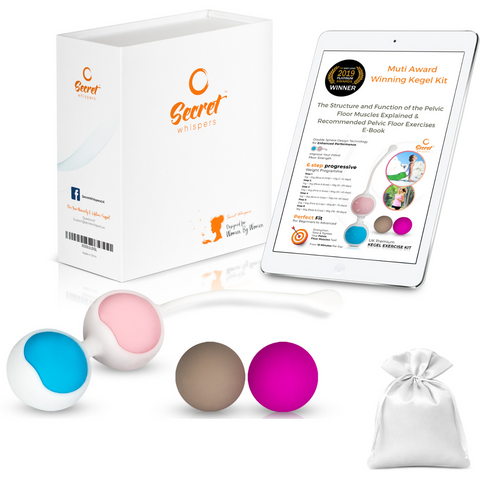Cyclical Incontinence - The Link Between Bladder Control & Your Period
Are you one of the countless women who find themselves racing to the restroom more frequently before or during your period? If so, you may be experiencing what's known as cyclical incontinence.
This condition, often overlooked or misunderstood, involves a temporary loss of bladder control that coincides with the menstrual cycle.
Sadly, their is very little research on this condition.
So, lets look into exactly what cyclical incontinence is and get a better understanding and what you can do to help improve this.
Understanding this connection is crucial for managing symptoms and maintaining quality of life.
Their was a research findings revealed that :
41% of women observed a cyclical pattern in their incontinence symptoms. Among these women, 42% reported experiencing heightened symptoms shortly before their menstrual period, while 36% noticed an increase in symptoms during their period.

Why Do I Have Bladder Incontinence During My Period?
Experiencing bladder incontinence during your period can be frustrating and uncomfortable, but understanding the reasons behind this occurrence can help you better manage your symptoms. Several factors contribute to the increased likelihood of bladder leakage during menstruation:
-
Hormonal Fluctuations: The menstrual cycle is governed by hormonal changes, particularly fluctuations in estrogen and progesterone levels. These hormones can influence bladder function, leading to changes in urine production and bladder muscle tone. As estrogen levels decrease just before menstruation, the pelvic floor muscles may weaken temporarily, making it more difficult to maintain bladder control.
-
Uterine Contractions: During menstruation, the uterus contracts to shed its lining, resulting in increased pressure on the bladder. This pressure can exacerbate existing bladder sensitivity and contribute to urinary urgency and leakage.
-
Fluid Retention: Many women experience fluid retention or bloating during their menstrual period due to hormonal fluctuations. The increased fluid volume in the body can put additional pressure on the bladder, making it more difficult to control urinary function.
-
Increased Sensitivity: The pelvic organs, including the bladder, may become more sensitive during menstruation due to changes in hormone levels and inflammation in the pelvic region. This heightened sensitivity can manifest as increased urinary urgency and frequency, leading to episodes of incontinence.
-
Menstrual Products: The use of menstrual products such as tampons or sanitary pads can also contribute to bladder incontinence during menstruation. Improper placement or prolonged use of these products can put pressure on the bladder or irritate the urethra, leading to urinary leakage.
-
Underlying Conditions: In some cases, underlying medical conditions such as endometriosis, pelvic inflammatory disease (PID), or interstitial cystitis (IC) may exacerbate bladder symptoms during menstruation. These conditions can cause inflammation and irritation in the pelvic region, affecting bladder function and increasing the likelihood of urinary incontinence.
Does Lack of Estrogen Cause Bladder Leakage?

Estrogen plays a crucial role in maintaining the health of the urinary tract, including the bladder and urethra. As estrogen levels fluctuate during the menstrual cycle and decline during menopause, changes in bladder function can occur.
Reduced estrogen levels can lead to thinning of the urethral lining and weakening of the pelvic floor muscles, increasing the likelihood of bladder leakage.
Can Perimenopause Cause Urinary Incontinence?
Perimenopause, the transitional phase leading up to menopause, is characterized by hormonal fluctuations that can contribute to urinary incontinence. As estrogen levels fluctuate unpredictably, symptoms of bladder leakage may worsen. Implementing strategies to support bladder health, such as those mentioned earlier, can help manage incontinence during this stage of life.
Does HRT Stop Bladder Leakage?
Hormone replacement therapy (HRT) can help alleviate symptoms of menopause, including urinary incontinence, by replenishing estrogen levels and restoring urogenital health. However, the decision to pursue HRT should be made in consultation with a healthcare provider, weighing the potential benefits and risks based on individual health factors.
How To Keep My Pelvic Floor Muscles Strong?

Kegels! Yes, you can even do your Kegels while on your period. You should be aiming for 2 to 3 sets every single day. May sound a lot, but with practice this becomes your daily habit.
Maintaining strong pelvic floor muscles is crucial for bladder control and overall pelvic health.
Kegels are simple yet effective exercises designed to strengthen the pelvic floor muscles.
- To perform Kegels, contract the muscles you would use to stop the flow of urine and hold in wind at the same time.
- Hold for a few seconds, then release.
- Gradually increasing the duration of your holds as your muscles become stronger, to eventually be able to hold this contraction for 10 seconds.
- Aim for three sets of 10-15 repetitions each day,
You can also use my Kegel Exercise Weights that work by teaching you where your pelvic floor muscles are and designed to gradually strengthen and tone your pelvic floor muscles.
Working out 🏋️♀️
My 3 children all do weights and now so do I! I’ve incorporated my kegel weights into my morning shower routine and find they are easy to insert, feel comfortable and give me a focus for doing my pelvic floor exercises. Anne (March 2024)
In conclusion, cyclical incontinence represents a common yet often overlooked aspect of women's health, with a clear link to the menstrual cycle and hormonal fluctuations.
By understanding the underlying mechanisms and implementing appropriate management strategies, women can take control of their bladder health and minimize the impact of incontinence on their daily lives.
Consult with a healthcare professional for personalized recommendations and support on your pelvic floor strengthening journey.
If you found this blog useful you may like -
Can You Do Kegel Exercises While on Your Period?
Iron Rich Foods For Heavy Periods
6 Things To Know About Menopause
Endometriosis and The Pelvic Floor
Make The Switch – Menstrual Cups
For more information on urinary incontinence and pelvic health, explore our Multi Award Winning Pelvic Floor Strengthener.
Designed to strengthen your pelvic floor muscles from just 15 minutes a day. Improve prolapse, stress and urge incontinence in 6 easy steps.
Just 15 minutes a day to a stronger pelvic floor and they last for LIFE!
You can also join our fabulous womens only private Facebook Group
Never miss another blog again. Sign up now to our weekly Newsletter. You will get a 10% discount code to use too. Just click below ⬇️⬇️⬇️












